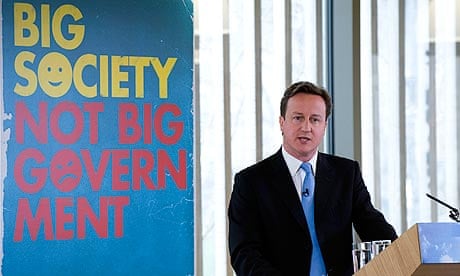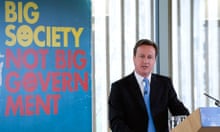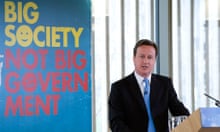For critics of David Cameron's "big society" vision it has been an obvious question: what would make hordes of previously inactive citizens leap to their feet to volunteer to fish trolleys from canals or look after elderly neighbours?
Now one local authority believes it has the answer: "big society reward points" redeemable in supermarkets, high street shops and restaurants in return for good deeds.
Windsor and Maidenhead council hopes to join forces with a commercial rewards scheme such as Nectar – whose points can be redeemed in Sainsbury's, Homebase and Argos among others – or RecycleBank, whose vouchers can be spent in outlets including Marks & Spencer and McDonald's.
The council, one of four chosen by the government to lead the big society "vanguard", hopes the system could eventually be rolled out nationwide.
Officers are still working out the practicalities, but it is likely residents would get a loyalty card similar to those available in shops. Points would be added by organisers when cardholders had completed good works such as litter-picking or holding tea parties for isolated pensioners.
The council says the idea is based on "nudge theory" – the thought that people don't automatically do the right thing but will respond if the best option is highlighted. Points would be awarded according to the value given to each activity.
Users could then trade in their points for vouchers giving discounts on the internet or high street.
The points would be given free by the commercial partner in return for the publicity and marketing opportunities, with the local authority picking up the relatively small cost of administering the scheme. The scheme might be extended to reward improved behaviour in areas such as school attendance and healthy living, according to the Conservative council's leader, David Burbage.
Although he ruled out offering rewards for losing weight or quitting smoking, he said: "We're not picky really … Anything that works, we'll give it a go.
"Where people are doing stuff in the community or contributing to local public services we would see no reason why we couldn't also extend that reward approach to promoting that positive activity.
"If you found one shopping trolley and picked it out of a river you might get less points than if you spent the day planting trees.
"We think it has a lot of promise to get people involved."
Matthew Taylor, the chief executive of think tank the RSA, which has
worked extensively on how the big society might be created, said the
scheme was a "great idea".
"It's very easy to take the mickey but it's good," he said. "The
question is how we get citizens to step up to the plate.
"Small economics go a long way when it comes to voluntary activity.
You don't have to choose between paying people and giving them nothing
at all."
But Rachael Maskell, national officer for the not for profit sector
with the union Unite, labelled the scheme discriminatory and gimmicky.
Only those with the time and physical ability to do good deeds would
be able to earn points, she said
"It's a kind of panicked reaction to the fact that nobody's taking up
the big society. The voluntary sector is in a desperate situation
undergoing huge cuts, and now we're seeing this fluff around the
side."
The government welcome the initiative. Nick Hurd, the minister for
civil society, said: "Big society is about encouraging and supporting
those people who want to contribute more to help others and improve
their community.
"If we can incentivise more people into giving their time and talent
then we unleash a hidden wealth of resource to help improve a range of
social problems."



Comments (…)
Sign in or create your Guardian account to join the discussion